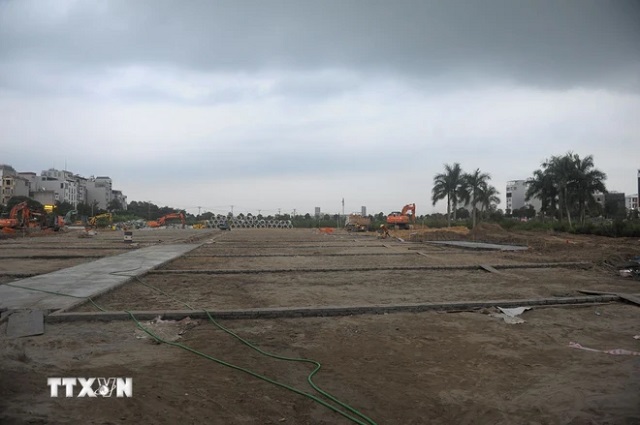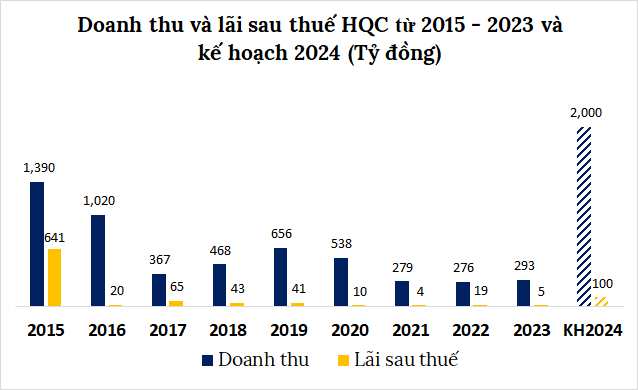
Saigon River waterfront in Thu Thiem Urban Area, Ho Chi Minh city. (Photo: Hong Dat/VNA)
|
Ho Chi Minh City plans to auction 4 land plots in Thu Thiem area and 3,790 apartment units formerly built for resettlement in 2024. The event has drawn attention from both investors and the public.
Experts say that in order to learn from previous land auction “turmoil”, it is necessary to have regulations and mechanisms to filter investors.
Ho Chi Minh City plans to auction 3 plots for multifunctional urban areas, focusing on developing housing and a small part of commercial service area in Thu Thiem urban area. The remaining plot in Functional Area 7 is planned for a resort hotel. The document preparation time is from May to October 2024, and the auction is expected to take place from July to November this year.
Then, in September and November 2025, Ho Chi Minh City plans to continue to auction 7 more plots. These are multifunctional plots, including housing, offices, retail malls, etc. The plots are concentrated in Functional Areas 1 and 3, with strategic locations with good connections to Ba Son Bridge and existing public utilities…
Experts say that it is necessary to learn from the unsuccessful auction in Thu Thiem in 2021, when winning bidders at prices 7-8 times higher than market prices withdrew their deposits, negatively impacting the market at that time. At that time, the land price for the winning project was much higher than the market price, limiting the access to the project for investors with potential and genuine interest.
Currently, the local government is finalizing the stages in the auction process, such as: auction方案, reorganization of the auction, determination of starting price; including the method of determining the starting price according to Decree 12/2024/ND-CP amending and supplementing Decree No. 44/2014/ND-CP on land prices, which was issued on 05/02/2024.
This Decree provides specific detailed regulations on methods for determining land prices, applicable conditions, procedures, and content for determining land prices by different methods. Therefore, the determination of the starting auction price is regulated clearly, in detail, and transparently – experts commented.
Regarding the current auction, experts say that it is necessary to screen investors. Decree 10/2023-NĐ-CP, amending and supplementing a number of articles of the decrees guiding the implementation of the Land Law, stipulates that organizations participating in the auction of land use rights must be eligible to be allocated land or leased land by the State. In case there are 2 or more companies with cross-ownership, only one company will be allowed to participate in the auction.
The participating unit must deposit 20% of the total value of the land plot, the land area calculated based on the starting price for auctioning the land use rights; meet other conditions stipulated by relevant laws.

Illustrative photo. (Photo: Manh Khanh/VNA)
|
In addition, Article 125 of the 2024 Land Law also provides additional regulations on participating organizations, such as: having capacity and experience in project development; having financial capacity to ensure land use in accordance with the progress of the investment project.
Thus, it is necessary to specify the criteria for selecting investors with potential and genuine interest. This is also one of the factors for screening and selecting higher quality investors.
Regarding the experience of investors, experts recommend considering the criteria of business performance in recent years, the time of operation of the enterprise, total capital, and the number of real estate projects that have been implemented.
The ability to implement the project can be screened by reviewing their expected development plans on the land participating in the auction, such as conditions on equity, land use fee payment arrangement plan, and project development capital mobilization capacity. At the same time, researching the feasibility of business plans and development. This screening helps to avoid units that are capable of disrupting the market – experts emphasize.
One of the contents of particular concern is the starting land price. Mr. Troy Griffiths – Deputy Managing Director of Savills Vietnam said that for large-scale investment projects with a long development period and approved detailed plans, the starting price is often determined based on the surplus method.
This method estimates the total development cost based on “land use coefficient, construction density, maximum number of storeys of the building” according to the approved plan. However, in reality, these planning parameters may not necessarily be the most effective land use plan, most suitable for the market.
Mr. Troy Griffiths cited an example that many land plots with commercial areas for offices or hotels are too high in areas that do not develop these two types. Therefore, when determining the land price, it may lead to a difference between the starting price given and the market price that investors can bid for. This leads to the possibility of the auction being unsuccessful due to the starting price not being attractive to investors.
“To avoid this, it is necessary to have appropriate planning and a reasonable starting price. In addition to the responsible unit and competent state agency, it is necessary to involve specialized consulting units (planning and market), who understand development,” shared Mr. Troy Griffiths.
From the perspective of the auction format, Ms. Do Thi Thu Giang, Director of Savills Vietnam Consulting Services, commented that according to the current Auction Law of Assets 2016, there are 4 forms of auction: Direct auction by oral bidding at the auction; Auction by direct voting at the auction; Auction by indirect voting; Online auction. In general, the auction format is divided into direct (verbal or voting) and indirect (sealed envelope).
When bidding directly (by oral bidding or direct voting), it is a process where the bidders participate directly in the auction, taking turns to make their bid prices. Each time a participant makes a new offer, the highest price will be updated until no one wants to raise the price anymore. In oral bidding, the pressure of the live auction environment can sometimes lead to impulsive bidding or overbidding.
The advantages of this form are that the auction can be carried out to the end, transparently, with direct competition and contributing to an increase in budget revenue. However, the limitation of this form is that it is easy to reveal information, prone to collusion, or as in the 2021 auction, inflating prices and then withdrawing deposits – Ms. Giang warned.
In contrast, the indirect voting format involves participants submitting sealed bids without knowing the bids of other participants. The highest bidder will win the auction and pay the amount they bid. However, this format does not encourage the auction to be carried out to the end and requires a strict monitoring mechanism when opening the bids.
However, this auction format also has advantages such as reducing pressure because indirect bidding can reduce some of the pressure of direct bidding. Because bidders can take their time to consider their bids without feeling rushed or being affected by the energy of the live auction room.
Some solutions “suggested” by experts such as “anonymity” will help protect the information of the bidders. Bidders may not know who they are competing against. But this could lead to more strategic bidding behavior. This can be beneficial for buyers who want to keep their identity private or for those who do not want to reveal their bidding strategy to others.
For fairness and to prevent collusion, anonymous participants’ information helps promote fairness and prevents collusion among bidders.
Regarding the advance payment (deposit), experts say that according to current regulations, there is a difference in advance payment in the auction of assets. According to the current Auction Law of Assets, in Clause 1, Article 39, the amount of advance payment is agreed upon by the auction organization and the person with the asset for auction, but not less than 5% and not more than 20% of the starting price of the auctioned asset.
Meanwhile, Decree 10/2023-NĐ-CP stipulates that organizations participating in the auction of land use rights must deposit an amount equal to 20% of the starting price, this regulation has been applied since 20/05/2023.
However, Ms. Giang said that the Land Law stipulates that bidding is conducted in accordance with the provisions of the Auction Law of Assets. Therefore, in order to limit the situation of taking advantage of the auction to disrupt the market and profiteering, it is possible to consider raising the minimum advance payment rate to 10%, instead of 5







































